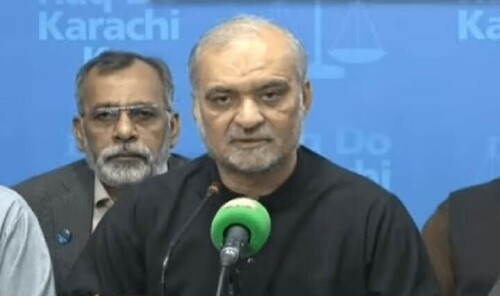THE Pakistan National Centre on Dec 25, 1973 organised in Karachi a special event to celebrate the 97th birth anniversary of the founder of the nation, Quaid-i-Azam Mohammad Ali Jinnah. Speaking on the occasion, former chief minister of Sindh M Ayub Khuhro, who played an important role in the Pakistan movement, said the Quaid-i-Azam believed in
democracy and fair play.“If his motto — unity, faith and discipline — was adhered to nobody would be able to harm Pakistan. The country is here to stay.” He said Mr Jinnah was first met with opposition from local leaders in every province that he visited. But gradually the people realised the value of his selfless service to the masses and compelled those leaders to follow him. Mr Khuhro pointed out that the Quaid-i-Azam fought the might of Hindus and the British, and finally succeeded in carving out a homeland for the Muslims.
A similar meeting of the All Pakistan Labour Federation was held at Khaliqdina Hall addressing which Syed Hashim Raza said the Quaid-i-Azam brought about a complete change in the outlook of Muslims of the subcontinent in eight years.
The Quaid’s mausoleum is in Karachi, which was the capital of Pakistan when the country was incepted. Over the years, the population of the city grew disproportionately making it a hard-to-manage town. On Dec 26, the Federal Minister for Industrial Production and Town Planning, J A Rahim urged Karchiites to put their weight behind local bodies to ensure proper planning and improvement in civic amenities. Speaking at a reception given in his honour at Hotel Intercontinental he regretted the haphazard approach to expansion of basic civic services in the past. He claimed the government had taken up schemes that envisaged the provision of amenities to the countryside to prevent overgrowth of towns.
This was the time when a new chief minister of Sindh, Ghulam Mustafa Jatoi, had assumed office. On Dec 27, in an informal discussion with the media at Karachi airport he said everything was ‘alright’ when he took over. “I must put on record the efforts of my predecessor [Mumtaz Ali Bhutto] during the last two years despite difficulties and odds. It was a successful term in office.” On development, the chief minister revealed that he had reviewed the ongoing plans and would try to push for their implementation.
With regard to infrastructural plans, on Dec 29 it was announced that the Karachi Development Authority (KDA) would construct 1000 low-priced nucleus houses at a cost of Rs4 million. Out of them, 400 were to be built in SITE, 350 in Landhi and 250 in Korangi. A spokesman for the authority said tenders had been awarded to contractors and construction was expected to begin in the ‘near future’. Apart from that, the KDA had almost completed work on 36 multi-storey flats and 12 shops in Lyari especially designed to suit labourers.
And on Dec 30, this newspaper reported that the city’s only subway on Abdullah Haroon Road would be reconstructed entirely by the Karachi Municipal Corporation (KMC). The project having an estimated cost of Rs1m was to start from the first week of February 1974 and expected to get the finishing touches in September.
Published in Dawn, December 25th, 2023













































Dear visitor, the comments section is undergoing an overhaul and will return soon.